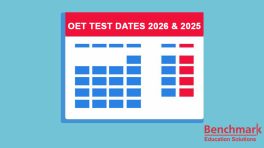

OET for ECFMG Guide 2025
Many medical graduates are now eager to practice medicine in the United States due to the amazing opportunities in this field. To do this, they must achieve an ECFMG® certification, which now involves passing the OET Medicine exam. This blog will provide an overview of ECFMG certification requirements and practical tips to succeed in taking the OET Medicine test.
Table of Contents
1. Understanding ECFMG Certification
ECFMG, or the Educational Commission for Foreign Medical Graduates, is a certification that IMGs or International Medical Graduates need to receive if they wish to practice medicine in the United States. This certification is generally a prerequisite for:
- Entering ACGME-accredited residency or fellowship
- Taking the final step of the USMLE® (United States Medical Licensing Examination)
- Obtaining a valid US medical license
This certification helps to ensure that the IMGs meet the required standard to provide high-quality healthcare in the US.
2. USMLE Changes for ECFMG
To obtain the ECFMG certification, IMGs had to pass Step 1, Step 2 Clinical Knowledge, and Step 2 Clinical Skills of the USMLE. However, the Step 2 Clinical Skills exam has been suspended due to COVID-19 and replaced by other pathways. It’s important to note that all of these pathways now require completing the OET Medicine test.
3. What is the OET?
The OET, or the Occupational English Test is designed to assess how proficient healthcare professionals are in English. To be eligible for 2025 Pathways of ECFMG certification, IMGs must achieve at least a minimum score of 350 or a grade B in each of the three test subsets (Reading, Speaking, and Listening) and at least 300 in the Writing section. Do not confuse this with any other English proficiency tests as this specific test is tailor made specifically for physicians thus all language skills assessed would be relevant to medical practice.
4. Tips for Achieving Grade B in OET Medicine
You must achieve at least a Grade B, and here are some tips that could help you achieve this grade.
- To do well on the OET, you must be familiar with the test structure. Make sure you are comfortable with each section’s layout and timing so you can manage your time more effectively during the test.
- Focus on Writing and Speaking Skills. You should practice writing and speaking more because they require clear and professional communication. You can also practice writing medical letters and engaging in role-play scenarios to further enhance your skills and make yourself comfortable with the test.
- Practice with OET-specific study materials to stimulate the actual test. Check out our free OET Test to assess your starting point. Make sure that you also look at our OET mock tests with answer explanations so you understand where you went wrong.












